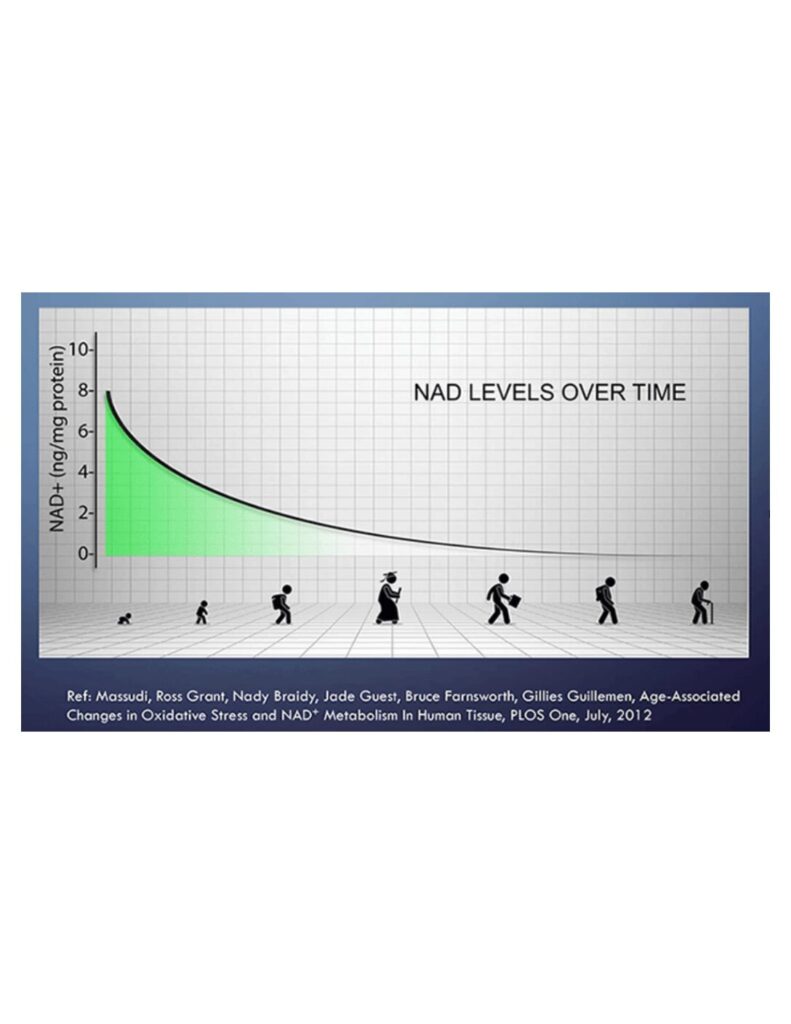In recent years, Nicotinamide Adenine Dinucleotide (NAD) has received significantly more attention as many Americans deal with long haulers from COVID-19, chronic fatigue and brain fog. NAD is a coenzyme found in every cell in our bodies. It is a derivative of vitamin B3 and an essential building block for a healthy body, mind and neurological system. NAD is utilized in energy production, DNA repair, gene expression, cell signaling, neurotransmitter production and enzyme activity.
NAD DECREASES EXPLAINED
At birth, our NAD levels are at their highest point. Roughly every 20 years, our NAD levels decrease by 50%. By age 40, we only have about 25% of our original NAD pool. NAD is also depleted with chronic disease and toxic burden. As NAD levels rapidly decline, all the enzymatic activities occurring in our bodies must fight over the remaining NAD. Low levels of NAD cause a decrease in the body’s NAD/NADH ratio which slows down energy production and can lead to symptoms of chronic fatigue and brain fog.
HOW NAD CAN REPAIR MITOCHONDRIAL DNA
When NAD levels are increased, our cells produce more energy and in turn, our bodies are able to repair defective mitochondrial DNA. Raising NAD levels slows cognitive decline, promotes healthy brain function, regenerates cells and slows aging. Individuals who have increased their NAD levels report greater mental clarity, better problem-solving skills, improved focus and concentration, increased energy and metabolism, reduced sugar cravings, improved mood, decreased anxiety, improved hearing and eyesight, reduction of migraines, decreased dizziness and improved exercise tolerance.
REPLENISHING NAD LEVELS WITH IV THERAPY
While NAD is available as an oral supplement, it is not particularly bioavailable. Currently, IV therapy is the safest, most effective way to ensure adequate bioavailability and supplementation of NAD. Repairing mitochondrial DNA is a massive undertaking for our cells that requires a substantial amount of energy. This can lead to some discomfort during IV therapy, including chest tightness, numbness and tingling in the arms and legs, abdominal pain, headaches and sinus congestion. The rate of infusion can be slowed in order to decrease negative symptoms.
CONDITIONS IMPROVED WITH NAD IV THERAPY
NAD IV therapy may be beneficial to individuals suffering from the following: • Alzheimer’s disease • Parkinson’s disease • Heart disease • Diabetes • Mitochondrial dysfunction • Multiple sclerosis • Memory/cognitive issues • Fibromyalgia • Anxiety/depression • Chronic fatigue • Long haulers from COVID-19
DELAY THE AGING PROCESS WITH NAD IV THERAPY
You do not need to wait until you are experiencing age-related issues or illnesses to increase your NAD levels. NAD IV therapy may help delay the aging process and lower the risk for certain medical conditions
Nicole Hujer NMD, APH

